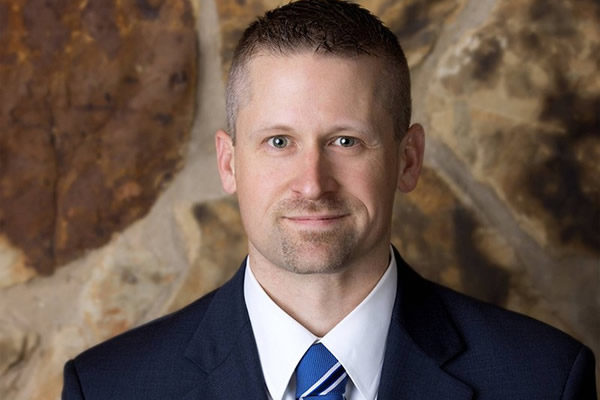News
Senate confirms anti-LGBT judicial nominee who stood up for Kim Davis
Trump nominee works ‘religious freedom’ law firm


Flouting the recognition of June as Pride Month, the U.S. Senate approved on Wednesday a Trump judicial nominee who has a long anti-LGBT record, including defense of Kim Davis for refusing to give marriage licenses to same-sex couples.
The Senate confirmed Matthew Kacsmaryk to a seat on the U.S. District Court for the Northern District of Texas by a vote of 52-46.
Joining the united Democratic caucus in opposition to Kacsmaryk was Sen. Susan Collins (R-Maine), who cited in a statement his “alarming bias against the rights of LGBTQ Americans and disregard for Supreme Court precedents.”
Sen. Tammy Baldwin (D-Wis.), the first out lesbian elected to the Senate, called on her colleagues from the Senate floor to vote against Kacsmaryk based on his anti-LGBT record, displaying on a placard the title of one of his writings: “The Inequality Act: Weaponizing Same-Sex Marriage.”
Baldwin said he heard from dozens of parents of transgender children who have voiced concern about the prospect of Kacsmaryk on the bench.
“I urge my colleagues to send the message to those children, their parents, and the broader LGBTQ community, and the country, that they do count, that they count, that they matter, that we hear their voices, and please, reject this nominee,” Baldwin said.
Also speaking out on the Senate floor against Kacsmaryk was Sen. Patty Murray (D-Wash.), who said his history demonstrates he won’t be an impartial judge and his views are “hateful and out the mainstream.”
“Mr. Kacsmaryk is another example of an extreme choice by President Trump to jam courts with individuals who will put their political views above the law and use their positions of power to chip away at people’s rights,” Murray said.
Before his confirmation, Kacsmaryk served as deputy general counsel of the Texas-based First Liberty Institute, an organization that seeks to advance religious freedom even at the expense of LGBT rights.
First Liberty Institute is responsible for the litigation filed by Aaron and Melissa Klein, the owners of “Sweetcakes by Melissa” in Oregon, who were fined $135,000 under state law for refusing to make a wedding cake to a lesbian couple and are now asserting a First Amendment right to refuse service to LGBT people.
Just this week, the U.S. Supreme Court vacated the fine and ordered the Oregon state courts to revisit the case under new guidance from the 2018 ruling in the Masterpiece Cakeshop case.
But Kacsmaryk has a long record of anti-LGBT positions and writings, defining the LGBT rights struggle at one time as a “clash of absolutes” between “religious liberty and sexual liberty.”
In response to the U.S. Supreme Court decision in favor of same-sex marriage nationwide, Kacsmaryk said the ruling found an “unwritten” right under the Fourteenth Amendment that was “a secret knowledge so cleverly concealed in the nineteenth century amendment that it took almost 150 years to find.”
When Rowan County Clerk Kim Davis refused to grant marriage licenses to same-sex couples, Kacsmaryk defended her, comparing her to Quakers who refuse fight in war and Jewish butchers who follow kosher dietary laws.
After the U.S. Equal Employment Opportunity Commission ruled in 2015 the prohibition on sex discrimination applies to cases of anti-gay discrimination, Kacsmaryk told The World, an outlet that reports on religious freedom, the decision was the latest in efforts to undermine marriage law.
“Traditionally and legally, we define sex according to chromosomes…That’s typically how we define sex,” Kacsmaryk said. “That’s how we ordered our marriage laws and made certain presumptions of paternity in the family code. All of that is cast into disarray if you declare sex irrelevant to marriage.”
When the Obama administration issued a rule interpreting the prohibition of sex discrimination under the Affordable Care Act to apply to transgender people, Kacsmaryk opposed the regulation and called it “radical self-definition and sex-actualization.”
LGBT rights supporters have also criticized Kacsmaryk for signing onto a comment when the rule was proposed saying transgender people suffer from a “psychological condition in need of care” and are “not a category of persons in need of special legal protection.”
The comment cites the opinion of a psychiatrist who has said having a transgender identity are suffering from a “delusion,” which critics have attributed to Kacsmaryk himself.
The White House didn’t respond to the Washington Blade’s request to comment on the LGBT opposition to Kacsmaryk.
Although Collins joined Democrats in voting against Kacsmaryk, the Maine Republican hasn’t applied a consistent standard with respect to judicial nominees based on their LGBT rights records.
For example, Collins last year voted in favor of the confirmation U.S. Circuit Judge Kyle Duncan despite his anti-LGBT record, which includes representing the Virginia school that sought to prevent transgender student Gavin Grimm from using the restroom consistent with his gender identity.
The Blade has placed a request in with Collins’ office on why she’d oppose Kacsmaryk, but not Duncan.

Maryland Gov. Wes Moore on Thursday signed a bill that seeks to combat efforts to ban books from state libraries.
House Bill 785, also known as the Freedom to Read Act, would establish a state policy “that local school systems operate their school library media programs consistent with certain standards; requiring each local school system to develop a policy and procedures to review objections to materials in a school library media program; prohibiting a county board of education from dismissing, demoting, suspending, disciplining, reassigning, transferring, or otherwise retaliating against certain school library media program personnel for performing their job duties consistent with certain standards.”
Moore on Thursday also signed House Bill 1386, which GLSEN notes will “develop guidelines for an anti-bias training program for school employees.”

The Mexican Senate on Thursday approved a bill that would ban so-called conversion therapy in the country.
Yaaj México, a Mexican LGBTQ rights group, on X noted the measure passed by a 77-4 vote margin with 15 abstentions. The Chamber of Deputies, the lower house of Mexico’s congress, approved the bill last month that, among other things, would subject conversion therapy practitioners to between two and six years in prison and fines.
The Senate on its X account described conversion therapy as “practices that have incentivized the violation of human rights of the LGBTTTIQ+ community.”
“The Senate moved (to) sanction therapies that impede or annul a person’s orientation or gender identity,” it said. “There are aggravating factors when the practices are done to minors, older adults and people with disabilities.”
Mexico City and the states of Oaxaca, Quintana Roo, Jalisco and Sonora are among the Mexican jurisdictions that have banned the discredited practice.
The Senate in 2022 passed a conversion therapy ban bill, but the House of Deputies did not approve it. It is not immediately clear whether President Andrés Manuel López Obrador supports the ban.
Canada, Brazil, Belgium, Germany, France, and New Zealand are among the countries that ban conversion therapy. Virginia, California, and D.C. are among the U.S. jurisdictions that prohibit the practice for minors.
The White House
Four states to ignore new Title IX rules protecting transgender students
Biden administration last Friday released final regulations

BY ERIN REED | Last Friday, the Biden administration released its final Title IX rules, which include protections for LGBTQ students by clarifying that Title IX forbids discrimination based on sexual orientation and gender identity.
The rule change could have a significant impact as it would supersede bathroom bans and other discriminatory policies that have become increasingly common in Republican states within the U.S.
As of Thursday morning, however, officials in at least four states — Oklahoma, Louisiana, Florida, and South Carolina — have directed schools to ignore the regulations, potentially setting up a federal showdown that may ultimately end up in a protracted court battle in the lead-up to the 2024 elections.
Louisiana State Superintendent of Education Cade Brumley was the first to respond, decrying the fact that the new Title IX regulations could block teachers and other students from exercising what has been dubbed by some a “right to bully” transgender students by using their old names and pronouns intentionally.
Asserting that Title IX law does not protect trans and queer students, Brumley states that schools “should not alter policies or procedures at this time.” Critically, several courts have ruled that trans and queer students are protected by Title IX, including the 4th U.S. Circuit Court of Appeals in a recent case in West Virginia.
In South Carolina, Schools Supt. Ellen Weaver wrote in a letter that providing protections for trans and LGBTQ students under Title IX “would rescind 50 years of progress and equality of opportunity by putting girls and women at a disadvantage in the educational arena,” apparently leaving trans kids out of her definition of those who deserve progress and equality of opportunity.
She then directed schools to ignore the new directive while waiting for court challenges. While South Carolina does not have a bathroom ban or statewide “Don’t Say Gay or Trans” law, such bills continue to be proposed in the state.
Responding to the South Carolina letter, Chase Glenn of Alliance For Full Acceptance stated, “While Supt. Weaver may not personally support the rights of LGBTQ+ students, she has the responsibility as the top school leader in our state to ensure that all students have equal rights and protections, and a safe place to learn and be themselves. The flagrant disregard shown for the Title IX rule tells me that our superintendent unfortunately does not have the best interests of all students in mind.”
Florida Education Commissioner Manny Diaz also joined in instructing schools not to implement Title IX regulations. In a letter issued to area schools, Diaz stated that the new Title IX regulations were tantamount to “gaslighting the country into believing that biological sex no longer has any meaning.”
Governor Ron DeSantis approved of the letter and stated that Florida “will not comply.” Florida has notably been the site of some of the most viciously anti-queer and anti-trans legislation in recent history, including a “Don’t Say Gay or Trans” law that was used to force a trans female teacher to go by “Mr.”
State Education Supt. Ryan Walters of Oklahoma was the latest to echo similar sentiments. Walters has recently appointed the right-wing media figure Chaya Raichik of Libs of TikTok to an advisory role “to improve school safety,” and notably, Raichik has posed proudly with papers accusing her of instigating bomb threats with her incendiary posts about LGBTQ people in classrooms.
The Title IX policies have been universally applauded by large LGBTQ rights organizations in the U.S. Lambda Legal, a key figure in fighting anti-LGBTQ legislation nationwide, said that the regulations “clearly cover LGBTQ+ students, as well as survivors and pregnant and parenting students across race and gender identity.” The Human Rights Campaign also praised the rule, stating, “rule will be life-changing for so many LGBTQ+ youth and help ensure LGBTQ+ students can receive the same educational experience as their peers: Going to dances, safely using the restroom, and writing stories that tell the truth about their own lives.”
The rule is slated to go into effect Aug. 1, pending any legal challenges.
****************************************************************************

Erin Reed is a transgender woman (she/her pronouns) and researcher who tracks anti-LGBTQ+ legislation around the world and helps people become better advocates for their queer family, friends, colleagues, and community. Reed also is a social media consultant and public speaker.
******************************************************************************************
The preceding article was first published at Erin In The Morning and is republished with permission.
-

 State Department4 days ago
State Department4 days agoState Department releases annual human rights report
-

 District of Columbia2 days ago
District of Columbia2 days agoCatching up with the asexuals and aromantics of D.C.
-

 South America2 days ago
South America2 days agoArgentina government dismisses transgender public sector employees
-

 Maine3 days ago
Maine3 days agoMaine governor signs transgender, abortion sanctuary bill into law












